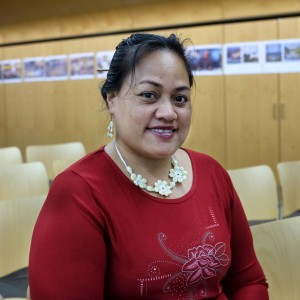Fishermen in Kiribati are finding it harder to catch fish because of rising sea temperatures, Pacific climate advocate Maria Tiimon Chi-Fang told a Christian climate justice conference in Sydney at the weekend.
People in the tiny island nation were being forced to change their diets, which traditionally revolved around fish and seafood, she told the Light the Way conference organised by social justice coalition Common Grace.
Ms Tiimon told Eternity today that fishermen in Kiribati were finding it too hot to go fishing during the day, as they used to, but had started to fish at night.
“In the past they never wore shirts, only a lavalava [short sarong], because they never got sunburnt, but now the fishermen have to wear T-shirts and buy sunburn creams because they are getting sunburnt.”
Based in Sydney, Ms Tiimon works as Pacific outreach project officer for the Pacific Calling Partnership. As well as attending international conferences, she talks to schools and community groups about the impacts of climate change in the Pacific. She told about 100 attendees at the Sydney conference that everyone in Kiribati, young and old, was worried about the future.
When I went in 2009, all the older people, like my dad, said ‘I was born here and grew up here and I’d rather die here. I don’t want to move out’.
“Last July when I went back, most of the older people now are really concerned about their grandchildren and their children and they are saying ‘We still don’t want to move but we want our children to move out for their future … we are so worried, do we really have a future?’ ”
Ms Tiimon said her 15-year-old niece, who wanted to be a doctor, was beginning to wonder if there was any point in studying.
“With this issue of climate change everybody is talking about, do we really have a future in Kiribati?” she said.
“I met some young children who have dreams to be pilots, nurses, police officers; but they are so scared, they are so worried, and their message to the world is ‘Please save us’.”
Another effect of climate change on the country of 33 tiny coral atolls was that the groundwater had become brackish. Ms Tiimon said she knew of three babies in a single family who had died in just one month from drinking water that was too salty.
“Nowadays, people are buying water bottles for the babies,” she said.
Ahead of the UN Climate Change Conference in Paris at the end of this month, Ms Tiimon called on Christians in Australia to connect with churches in Kiribati and Tuvalu, which is also badly affected, to work on raising awareness of climate change.
“For me climate change is not about money, it’s not about moving people to a safer place – it’s about giving choices to people who are very vulnerable and whose voices can hardly be heard in the international arena. That’s why we really need you people to support us … We have to work together because this planet is our home.”
Josh Gilbert, chairman of the NSW Young Farmers, told the conference that the agricultural industry was starting to adapt well to climate change and play a role in the climate justice movement.
He said the movement had gained momentum at the NSW Farmers Association conference last July where the Young Farmers triumphed over the sceptics and pushed through a much bolder climate policy.
Rather than a motion calling for a royal commission into whether climate change was real, the policy passed called for a move away from the use of fossil fuels and towards renewable sources of energy.
“This was the first time a farmers group adopted a policy that recognised that climate change was real and it got a lot of interest from around the country from people who want to do something similar,” he said.
Mr Gilbert said the agricultural industry was on the frontline of climate change.
“What it means for us as farmers is we’re going to have to feed an additional 2.3 billion people in the next 35 years, no mean feat. And we have to double the food supply we have today on the existing land, so we know we’re in for a challenge, but I think it’s something we’re up for.”
Mr Gilbert said he had shot a three-minute documentary for the Climate Reality Project, which featured his father, previously a climate sceptic, talking about how climate change was affecting him.
“Young farmers are creating a stir in the agricultural community, and it’s really inspiring that farmers are getting behind this and we’ve reached a tipping point towards our ultimate goal now and we’re going to have a voice.”
Email This Story
Why not send this to a friend?


